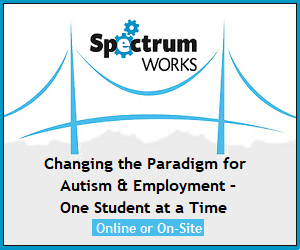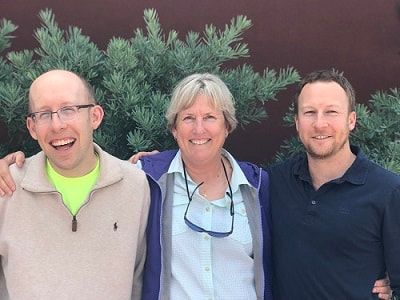Sanctuary's 4th Annual Autism Awareness Issue Proudly Sponsored By:
PARENT TO PARENT
Issues Parents Face While Raising Children on the Autism Spectrum
Editor’s Note: This is our 4th Annual Celebrating Autism Awareness issue. Over the years, we’ve received correspondence from parents who suggested a future topic, asked a question after reading one of our articles, or just wrote to say, ‘I’ve been there.’ This year, we decided to compile the most common questions and topic suggestions we received from parents and ask another parent to address them – someone who can offer advice from a practical perspective after having raised a child on the spectrum to adulthood.
|
A Message from Leslie Crawford:
I was a primary caregiver to my son, Andrew, for 29 years. I am now a writer, editor and local historian. Once our son was entrenched in his new home and we knew all his needs were well in hand, my husband retired, and we pursued one of our dreams - to travel around the U.S. in our little motorhome, “FaceTiming” with our son along the way. For all the challenges we’ve been through as a special needs family, it has also been an interesting life with highlights that most people will never experience. It’s made me a better person, and we’ve met so many wonderful people along the way, broadening our small circle into a big circle of really caring, “salt of the earth” friends and caregivers. |
Leslie with Her Son Andrew at His Gallery Opening
|
Do you have any tips for preparing a child on the spectrum to live up to his potential, and for those capable, to live an independent life?
As with most parents, this was always at the top of my mind while my son was growing up. That’s our goal as parents, isn’t it? Working toward these goals drove most of our IEP [Individualized Education Program] goals. Having said that, every child is different, so you have to figure out a reasonable path to success.
For instance, when my son was five, he was functioning at a two-year-old level in some areas, but he could easily handle the skills of a twelve-year-old in other areas. I found that using a list of typical milestones that most children reach helped me define my son's goals. This also helped me to articulate the information in a way everyone could understand.
As with most parents, this was always at the top of my mind while my son was growing up. That’s our goal as parents, isn’t it? Working toward these goals drove most of our IEP [Individualized Education Program] goals. Having said that, every child is different, so you have to figure out a reasonable path to success.
For instance, when my son was five, he was functioning at a two-year-old level in some areas, but he could easily handle the skills of a twelve-year-old in other areas. I found that using a list of typical milestones that most children reach helped me define my son's goals. This also helped me to articulate the information in a way everyone could understand.
|
Leslie with her sons, Andrew (left) and Mike (right)
|
Tip: To find a list of typical milestones online, search for ‘child development milestones.’ Milestones for the early years can be found on the CDC website.
What are some things parents should look for in their adult child that are signs he or she is ready to live independently? Teaching our kids - special needs or not - to be independent will look different in every case, but problem-solving skills were always the benchmark for me. In our case, even with repeated training during different scenarios, the results were not close to being consistent enough for us to have any level of comfort that our son could be independent on the most basic level. |
Many parents have a hard time truly letting their child have wings and make their own mistakes. For parents of children on the spectrum, this is even more difficult. When should you hold back, and when should you step in?
|
Safety should always be at the top of your mind when assessing whether it’s time to allow additional freedoms. It’s going to look very different for each child and will depend on an individual’s capabilities. Some kids are leaders, and some kids are followers. Does your child stand up for himself, or does he let others make decisions for him?
Allowing kids to have the opportunity to make mistakes is at the heart of growing up, but with our special-needs kids, that often backfires into frustration, anger and tantrums. The trick is making sure supports and guidance are in place to get things back on track when the learning process takes a turn. Again, it depends on a person’s special needs, so parents have to gauge appropriate expectations and individual circumstances. We want our children to learn and grow without setting them up for too many frustrating fails. Without the supports to work through the fails, it might lead to escalation of negative behaviors. |
|
In your opinion, and since the development of healthy relationships is often difficult for those on the spectrum, how much or little should a parent be involved, give advice, or guide their adult child when it comes to romantic relationships?
Again, it would be safety first for me. Love and friendship are basic human needs but that looks different for everyone. With my kids, if I see something developing, I might offer some generalizations about friendships and dating. However, unless I’m asked for advice, I would leave that one alone (but probably have a really anxious look on my face!).
Find an article from Autism Speaks on this topic.
Again, it would be safety first for me. Love and friendship are basic human needs but that looks different for everyone. With my kids, if I see something developing, I might offer some generalizations about friendships and dating. However, unless I’m asked for advice, I would leave that one alone (but probably have a really anxious look on my face!).
Find an article from Autism Speaks on this topic.
For parents with children with more severe challenges, what should a parent look for in a residential program?
Knowing our son was in a healthy, caring home situation - whether with his family or in residential care – was a perpetual cloud that hung in the distance and a subject that I worked on proactively for many years.
Some questions I pondered: How independent will he be? What will his financial situation look like? Will he need minimal supports from someone who visits him regularly, or will he need to live with someone who can oversee him 24/7?
There was so much growth in development until our son turned 16, and then it seemed to plateau. Until he exited the school district at 22 years old, we kept pushing for independence with everyday strategies. By the time he turned 22, we were able to assess pretty accurately what the long-term needs were going to be and what we were looking for.
We didn’t find any residential group home situations we were comfortable with early on, so we hatched a plan to build a home that would be large enough that we could eventually turn into a group home. We got the home built and got to work figuring out what it would take to operate the house as a group home. After a few years, it became obvious to us that, while we could initially set up and run a group home, the burning question about who would take over operations after we were gone were still unresolved.
It was about that time that an opening became available at Noah Homes where our son now lives. This environment has been everything we had hoped for and better. He’s been living in one of the houses with five other guys for almost eight years, and we couldn’t be happier. We know that he’s in great hands if and when my husband and I are no longer able to provide care and support.
Are there any financial preparations or documents a parent should be sure to have in place in case something happens to him/her and this parent is the primary caregiver or support for their adult child?
Knowing our son was in a healthy, caring home situation - whether with his family or in residential care – was a perpetual cloud that hung in the distance and a subject that I worked on proactively for many years.
Some questions I pondered: How independent will he be? What will his financial situation look like? Will he need minimal supports from someone who visits him regularly, or will he need to live with someone who can oversee him 24/7?
There was so much growth in development until our son turned 16, and then it seemed to plateau. Until he exited the school district at 22 years old, we kept pushing for independence with everyday strategies. By the time he turned 22, we were able to assess pretty accurately what the long-term needs were going to be and what we were looking for.
We didn’t find any residential group home situations we were comfortable with early on, so we hatched a plan to build a home that would be large enough that we could eventually turn into a group home. We got the home built and got to work figuring out what it would take to operate the house as a group home. After a few years, it became obvious to us that, while we could initially set up and run a group home, the burning question about who would take over operations after we were gone were still unresolved.
It was about that time that an opening became available at Noah Homes where our son now lives. This environment has been everything we had hoped for and better. He’s been living in one of the houses with five other guys for almost eight years, and we couldn’t be happier. We know that he’s in great hands if and when my husband and I are no longer able to provide care and support.
Are there any financial preparations or documents a parent should be sure to have in place in case something happens to him/her and this parent is the primary caregiver or support for their adult child?
|
"A special needs trust is the solution that ensures your special needs family member is supported comfortably without disrupting the government supports already in place." |
It is imperative that you have your trust and wills in order, with a special needs trust and instructions for guardianship or conservatorship for your child in your will.
The reason for a special needs trust is that you don’t want to disrupt the support your child receives from the state, and inheriting money can really disrupt those support systems. The first time I learned that we couldn’t allow our son to receive an inheritance, I was shocked. A special needs trust is the solution that ensures your special needs family member is supported comfortably without disrupting the government supports already in place. Unless you are extremely wealthy, you’re going to want and need to keep all possible supports in place. |
The other important step is to have a conservatorship in place when your child turns 18. Legally, when our children become adults, we no longer have the right to make decisions for them. For our special needs kids, this is problematic for everything from school to doctors to the legal system. Filing for conservatorship is a process necessary to continue to be effective advocates and caregivers for our special needs children.
I will say that even though I knew it was absolutely necessary to put a conservatorship in place for our son, it was a milestone moment. We all have them, whether it’s seeing our kids get their driver’s license, turning 50, or losing a parent. This milestone really struck a nerve with me and was an emotional rollercoaster. The conservatorship was a reality check – a slap in the face. Coming to terms with the fact that our son would always have someone making most of his decisions, while watching his non-special needs classmates start their lives as adults, was difficult.
Is it important for a parent with a child with autism to talk with other parents who have a child on the spectrum?
Definitely. This is a tough road we’re on, and most people simply can’t understand the depth of the pressures and worries that go with being a special needs parent. Even if your child’s needs are very different from other children, the shared experiences and sharing of resources helps ease the path a bit. It’s nice to know you’re not alone. Social media has been a significant gamechanger regarding sharing of information. I sure wish I’d had that outlet when Andrew was younger.
Our kids might all be different in their level of needs, but that gap narrows significantly when they reach adulthood. The resources available to our adult children are not typically as dynamic as the school environment in terms of diversity of programs and the laws behind them.
I will say that even though I knew it was absolutely necessary to put a conservatorship in place for our son, it was a milestone moment. We all have them, whether it’s seeing our kids get their driver’s license, turning 50, or losing a parent. This milestone really struck a nerve with me and was an emotional rollercoaster. The conservatorship was a reality check – a slap in the face. Coming to terms with the fact that our son would always have someone making most of his decisions, while watching his non-special needs classmates start their lives as adults, was difficult.
Is it important for a parent with a child with autism to talk with other parents who have a child on the spectrum?
Definitely. This is a tough road we’re on, and most people simply can’t understand the depth of the pressures and worries that go with being a special needs parent. Even if your child’s needs are very different from other children, the shared experiences and sharing of resources helps ease the path a bit. It’s nice to know you’re not alone. Social media has been a significant gamechanger regarding sharing of information. I sure wish I’d had that outlet when Andrew was younger.
Our kids might all be different in their level of needs, but that gap narrows significantly when they reach adulthood. The resources available to our adult children are not typically as dynamic as the school environment in terms of diversity of programs and the laws behind them.
Online Resources for Parents:
Spectrum Works: A New Jersey-based nonprofit that helps young adults with autism live up to their potential for stable, successful, economically self-sufficient lives.
Autism Speaks: Resources and Services for Adults with Autism.
AANE (Asperger/Autism Network): Services and Resources for Adults and Teens on the Spectrum.
CDC: A comprehensive list of additional resources.
Ascend Group: Online resources for individuals, families and professionals.
Spectrum Works: A New Jersey-based nonprofit that helps young adults with autism live up to their potential for stable, successful, economically self-sufficient lives.
Autism Speaks: Resources and Services for Adults with Autism.
AANE (Asperger/Autism Network): Services and Resources for Adults and Teens on the Spectrum.
CDC: A comprehensive list of additional resources.
Ascend Group: Online resources for individuals, families and professionals.





